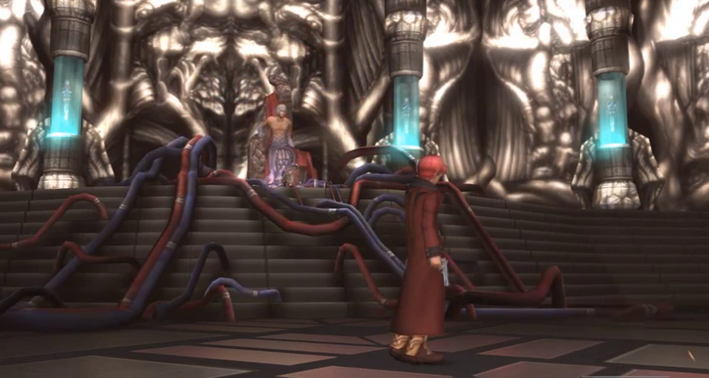The “final boss” is a piece of lingo that transcends gaming culture entirely, coming to mean an extremely hard culminating challenge. This makes sense: a final boss is the final challenge of a game, the penultimate test of the player’s skills. Though I would not consider myself immensely skilled, I still vastly enjoy the element of interactivity brought on by rules and challenges.
Why then, did Xenosaga Episode II’s strange final boss so quickly become one of my favorites?
Xenosaga Episode II is a Playstation 2 Japanese role-playing game, and the second chapter of the Xenosaga trilogy. It features many difficult battles, not the least of which is what my walkthrough referred to as the final boss: the Patriarch of the evil organization we had been fighting against all this time. Patriarch follows JRPG convention rather closely- he is a religious figure and one of authority at that, two concepts JRPGs are typically quite critical of. He has every cheap boss trick in the book: extremely damaging attacks, buffs and debuffs, the ability to act multiple turns in a row, and a surprise second phase. This, however, is precisely where Xenosaga II begins to depart from the norm.
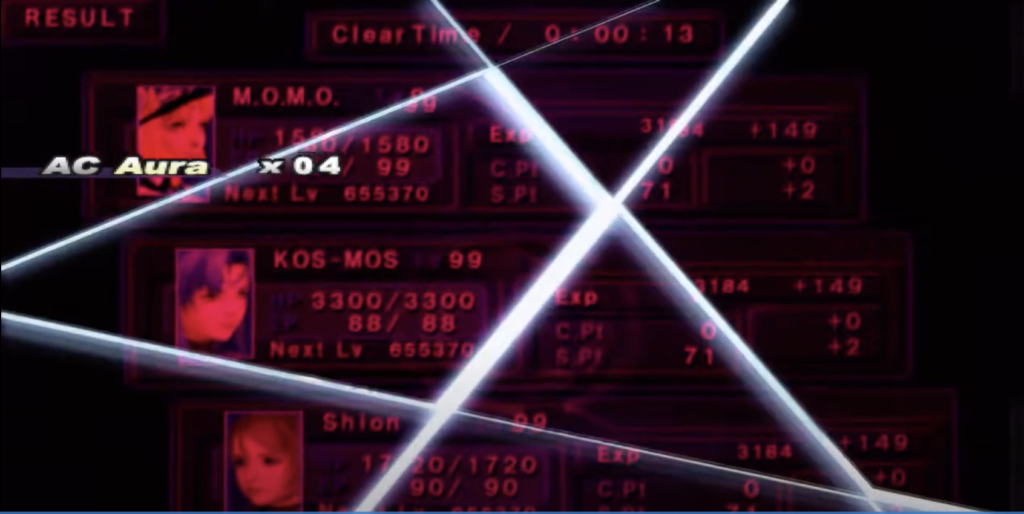
Patriarch’s second phase only comes after a fake victory screen. This in itself is not too uncommon- off the top of my head, I remember Bayonetta doing the same- but is still a striking meta-element, and clear subversion of typical genre expectations. The victory screen is meant to denote the end of a battle, yet it has been taken from the player at the last moment. Perhaps it is a sign of what is to come- that Patriarch is not truly the end. The game continues even after Patriarch is defeated for good, rather than advancing towards the credits. It is only after a great deal of cutscenes that the player finds themselves facing the true final boss of Xenosaga Episode II: the immortal feat of bioengineering known as Albedo.
This fight is unique for a great number of reasons, perhaps the most striking being its lack of difficulty. Despite the player being two characters short, and only having one character available for the battle, it is extremely easy. Albedo does not attack. He merely eggs you on as you fight him, just as he did in the cutscenes preceding. A box of text appears to tell you he is uplifted after every attack. There is no way to lose to Albedo- as long as the player continues attacking, he will eventually be defeated. It feels jarring to play. Albedo is immortal, recently ascended to the level of a god. Intense music accompanies the scene as the player continues to attack, wondering if this is some sort of fake-out- if he will eventually stop pretending, and unleash a devastating attack. You’ve fought him before, after all- twice!- and both times he was a reasonably difficult foe.
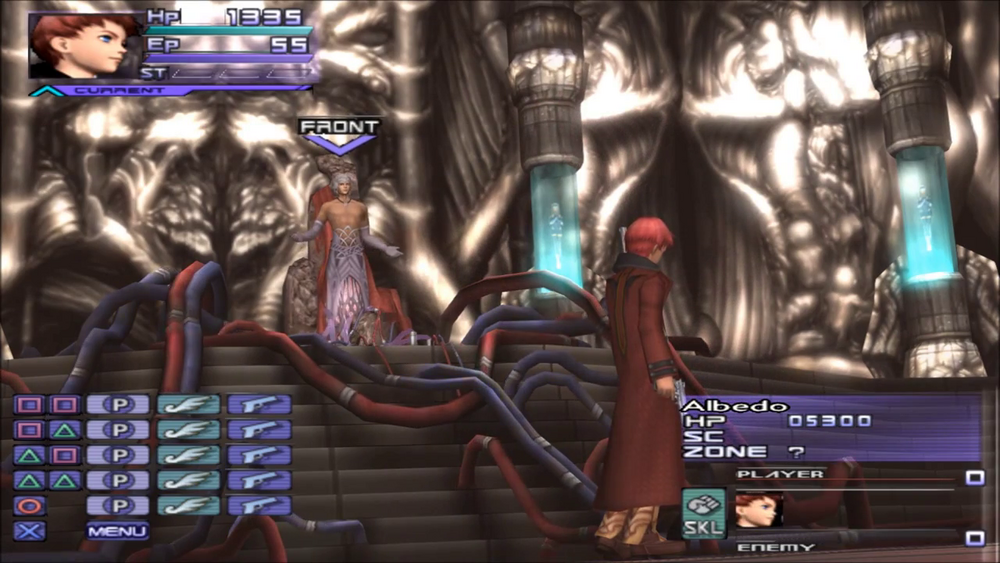
The feeling begins to build in the player’s mind: something is terribly wrong.
It is for this reason that beating Albedo hardly feels like a victory. The procedure echoes the narrative as the player character, Albedo’s twin brother, comes to the realization of what he’s done. In linking with god, Albedo has given up his immortality. Jr. has just fulfilled his greatest wish: relieving Albedo of the destiny that had tormented him since he was a child, the realization that he would grow to watch everyone he cared about die. You only won because Albedo wanted you to win.
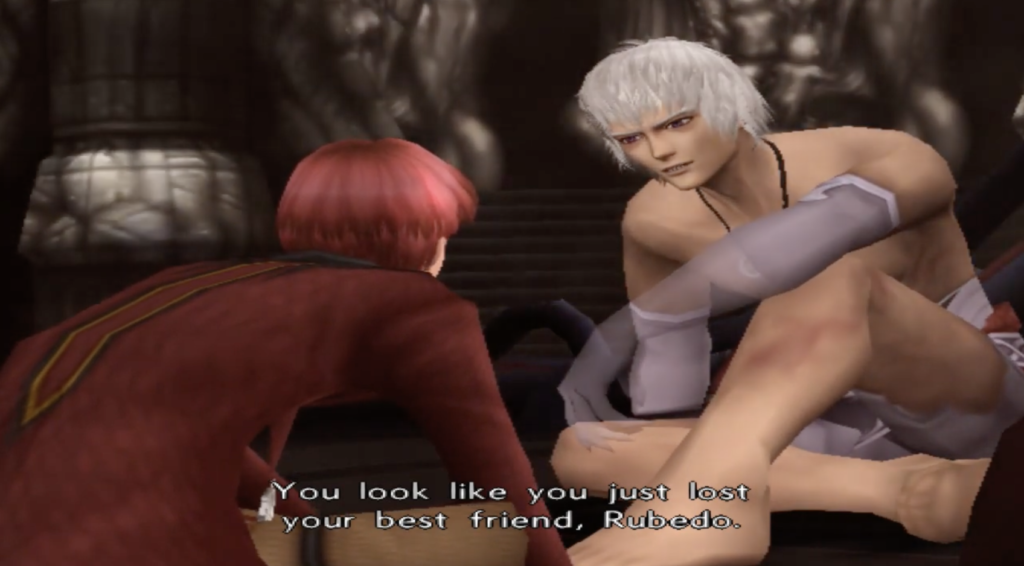
Through the conflicting mechanics of Xenosaga II’s final boss, the game evokes themes of inevitability and lack of closure, echoing the narrative and themes in a procedural manner which forces the player to grapple more closely with these concepts.
In this way, the final boss of Xenosaga Episode II complicates the game mechanics. Features that were once empowering choices in battle are now hollow and meaningless. Rather than finding break combos (series of attacks which stagger an enemy) through trial and error, the game simply gives the player Albedo’s, even as they keep changing. All the player is asked to do is press buttons- not strategize, or make tactical choices. In this way, the game empowers the player so much that the capabilities actually begin to feel disempowering.
The player is powerful, and the player will win the battle, but not through skill, thought, or even luck. It doesn’t matter which skills you have equipped on Jr., nor which attacks you choose to employ. You will win no matter what. Victory then is presented as inevitable. The player is powerless against this fate, with no choice but to kill Albedo.
The possibility space has shrunk so much, only permitting one character who will win no matter what, that it even begins to evoke feelings of unfulfillment. Many players relish a difficult final boss- they can be an opportunity to show off their skills, an exciting culmination to a game, or even just potent bragging rights. The final battle with Albedo is none of these, mechanically. It is a complete anticlimax.
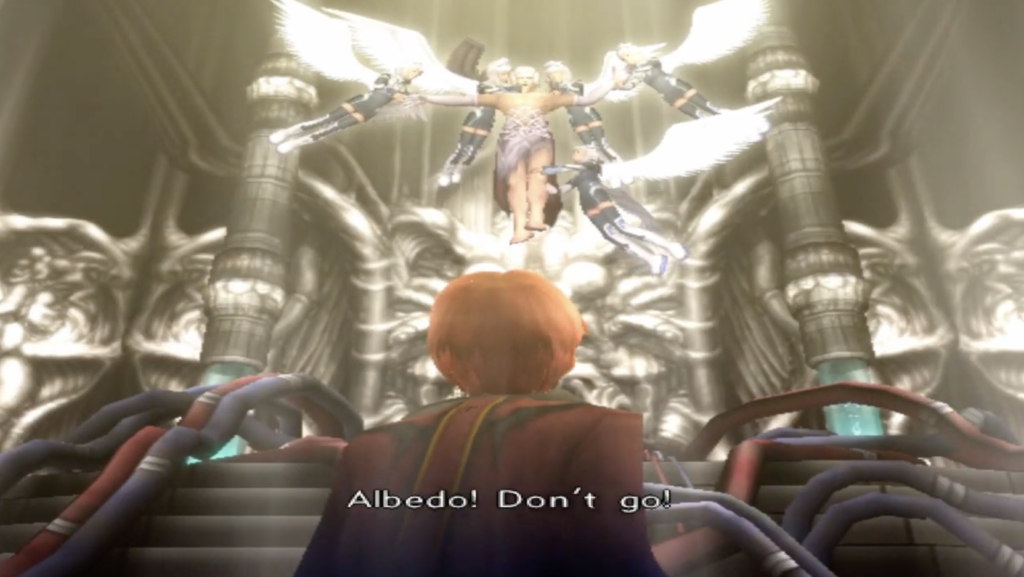
Don’t ask.
This lack of fulfillment extends to the narrative as well. Jr. is instantly upset when he realizes that his brother is dying- they have had an immensely fraught relationship, and now any chance for resolution has disappeared entirely. The ease of Albedo’s boss fight echoes the scene just afterwards, as Jr. tearfully begs Albedo not to leave him. More than that, however, this scene is representative of many of Xenosaga’s themes- Episode II in particular focuses on the difficulty of navigating sibling relationships (with the main character’s estranged older brother similarly dying despite her pleas in Episode III) and the entire series tackling the subjects of grief and coping with the past. The mechanics intentionally echo the sentiments of the characters, forcing the player to feel the sense of loss and unfulfillment Jr. is currently enduring.
Just as the player is powerless in the boss battle, Jr. is powerless to save his brother. Albedo’s death is presented as inevitable, in much the same way grief or change are. The procedural rhetoric both echoes these sentiments and implicates the player in this part of the narrative: just as Jr. had believed he shouldered the blame for Albedo’s madness, Jr. and the player both share the responsibility for Albedo’s death as we participate in the enacted story of the game.
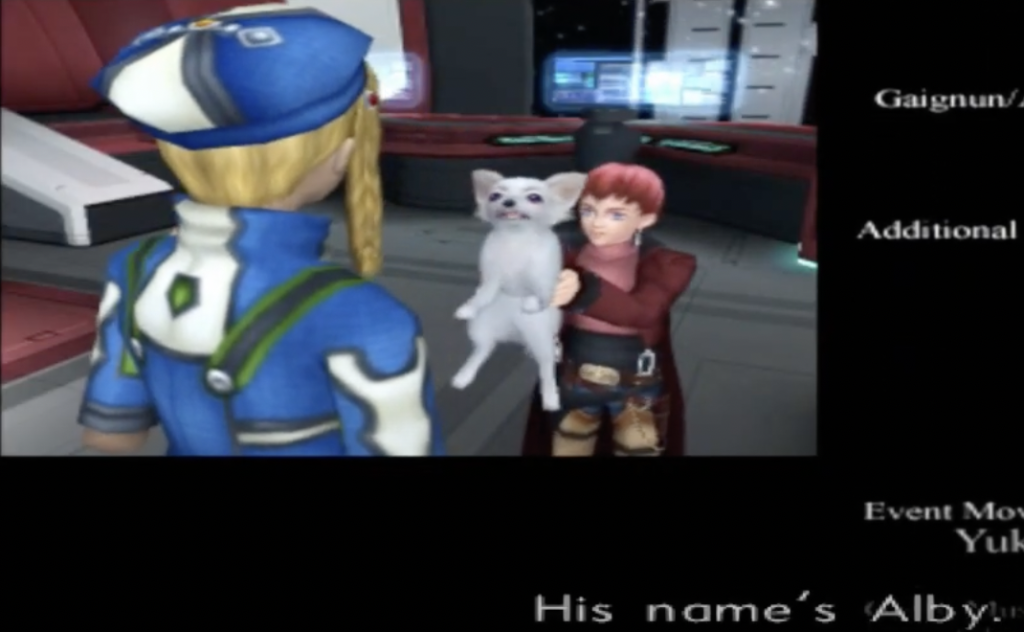
An Alby for your troubles.
